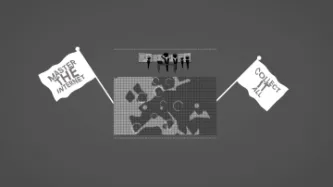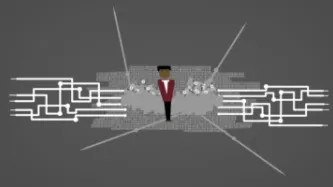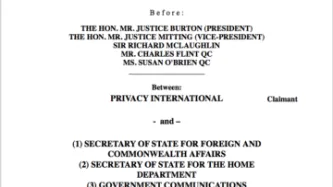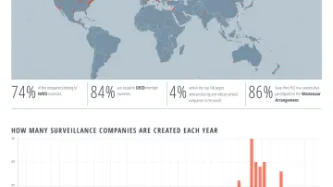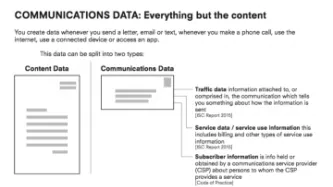Search
Content type: Long Read
The move to digital payments, without an adequate legal framework, is a double-blow to privacy. India is proving to be the case study of how not to do the move to the cashless society. We are seeing in India the deeper drives to digital: linking financial transactions to identity. On the 8th November, Prime Minister Modi of India announced that 500 and 1,000 rupee notes – 86% of the money supply – would be removed from circulation. The initial justification for this was to tackle the…
Content type: Long Read
In July 2015, representatives of a private company met in a parking lot in Pretoria, South Africa to sell phone tapping technology to an interested private buyer. What they did not know was that this buyer was a police officer. The police had been tipped off that the company was looking to offload the surveillance technology, an IMSI catcher, to anyone who would buy it. It is illegal to operate such surveillance technology as a private citizen in South Africa, and illegal to buy…
Content type: News & Analysis
This piece originally appeared in the Responsible Data Forum.
Would you mind if, every time you post a comment on Twitter, Facebook or another social media platform, the police logged it? I mean, it’s public — surely it’s fair game?
If you think that’s OK, then maybe it’s also OK for a police officer to follow you when you walk down a busy street. That’s also public, right?
Clearly, definitions of public and private become very problematic when you are communicating with potentially…
Content type: Press release
Privacy International has today published an investigation, which sheds light on the shady deals that built Syria’s surveillance state and the role Western companies have played in its construction. The investigation also shows how Western surveillance companies seek to exploit loopholes to do business with repressive states.
Key points:
Technical specifications acquired by Privacy International reveal the Syrian government’s ambitious mass surveillance projects, including a nationwide…
Content type: News & Analysis
Brexit and Privacy
It's as clear as mud, what it means when a country decides to willingly pull out of a trading bloc, a policy coordination mechanism, a relatively democratic network, and a framework for the free flow of people, data, and rights. Meanwhile today the minister in charge of surveillance for the past six years will assume the leadership of the country.
There is much speculation as to what is next. Here's our take. Importantly, there's a lot to be worried about, some to like…
Content type: Long Read
Tech firms and governments are keen to use algorithms and AI, everywhere. We urgently need to understand what algorithms, intelligence, and machine learning actually are so that we can disentangle the optimism from the hype. It will also ensure that we come up with meaningful responses and ultimately protections and safeguards.
Many technologists emerge from University, College or graduate courses with the impression that technology is neutral and believe that all systems they apply their…
Content type: News & Analysis
This piece was written by PI Research Officer Edin Omanovic and originally appeared here.
Whatever happens over the next few years, if there is to be a storm, then it is best to prepare. It is essential that western liberal democratic societies are resilient enough to uphold their fundamental values.
One of the UK’s biggest security assets is one of its biggest security threats. The UK’s spies have access to and are allowed to exercise some of the most sophisticated electronic…
Content type: Press release
For further information please contact PI Legal Officer Millie Graham Wood: [email protected]
For media enquiries please contact [email protected]
Documents obtained by Privacy International reveal the existence of a secret oversight function given to the Intelligence Services Commissioner (ISC), in operation since at least 2014. The details of this function, referred to as the ‘third direction’, remain redacted and only came to light following…
Content type: News & Analysis
This guest piece was written by Elonnai Hickok and Vipul Kharbanda of the Centre for Internet and Society. It does not necessarily reflect the views or position of Privacy International.
In light of the complex challenges and threats posed to, and by, the field of information telecommunications in cyberspace, in 1998 the draft resolution in the First Committee of the UN General Assembly was introduced and adopted without a vote (A/RES/53/70)…
Content type: Press release
Caroline Wilson Palow, General Counsel at Privacy International
“The passage of the Investigatory Powers Act is a major blow to the privacy of people in the UK and all over the world. It sets a world-leading precedent, but not one of which the Government should be proud. Instead of reining in the unregulated mass surveillance practices that have for years been conducted in secret and with questionable legal authority, the IPA now enshrines them in law. Widespread surveillance is an antithesis…
Content type: Press release
Privacy International has today written to government ministers, members of the opposition, and oversight bodies reaffirming its call for the UK government to reveal secret intelligence sharing arrangements with the United States.
The original UKUSA agreement — drafted shortly after World War II — allows UK and US agencies to share, by default, any raw intelligence, collection equipment, decryption techniques, and translated documents.
Current arrangements also allow US…
Content type: News & Analysis
Este artículo fue co-escrita con Valeria Milanes de la Asociación por los Derechos Civiles (ADC). Una versión en ingles está disponible aquí.
En Enero de 2015, el sistema de inteligencia de Argentina fue objeto de atención pública luego de la muerte del fiscal Alberto Nisman, debido a la presunta participación de los servicios de inteligencia en dicho suceso. Este escándalo impulsó la reforma del sistema de inteligencia del país.
En Febrero del mismo…
Content type: News & Analysis
The connectivity afforded by the internet has changed the world forever. While the increasing ‘corporatization’ of what many still feel is an open, non-hierarchical, largely uncensored and unfiltered ecosystem, this is increasingly not the case. The emergence of the ‘Internet of Things’ will soon throw into sharp relief who owns the internet and who owns the data we all generate when using the internet. Companies today have a vested interest in portraying their products as safe and…
Content type: Long Read
This piece was written by Ashley Gorski, who is an attorney at the American Civil Liberties Union, and PI legal officer Scarlet Kim and originally appeared in The Guardian here.
In recent weeks, the Hollywood film about Edward Snowden and the movement to pardon the NSA whistleblower have renewed worldwide attention on the scope and substance of government surveillance programs. In the United States, however, the debate has often been a narrow one, focused on the…
Content type: Press release
Key points
Bulk Communications Data (BCD) collection, commenced in March 1998, unlawful until November 2015
Bulk Personal Datasets regime (BPD), commenced c.2006, unlawful until March 2015
Everyone’s communications data collected unlawfully, in secret and without adequate safeguards until November 2015
We maintain that even post 2015, bulk surveillance powers are not lawful
As the Investigatory Powers Bill is set to become law within weeks, we argue that the authorisation and…
Content type: Long Read
On 17 October 2016, the Investigatory Powers Tribunal handed down judgment in a case brought by Privacy International against the Foreign Secretary, the Home Secretary and the three Security and Intelligence Agencies (MI5, MI6 and GCHQ).
The case concerned the Agencies’ acquisition and use of bulk personal datasets (‘BPD’) – datasets that contain personal data about individuals, the majority of whom are unlikely to be of intelligence interest, such as passport databases and finance-related…
Content type: Press release
This week in Geneva, the UN Human Rights Committee will examine Colombia’s compliance with the International Covenant on Civil and Political Rights (ICCPR). This review, by a body of independent experts charged with monitoring compliance with the ICCPR, comes just weeks after the peace deal between President Juan Manuel Santos and Farc leader Timoleon Jimenez was rejected by voters and months after it was revealed that an investigative journalist was put under surveillance by the Colombian…
Content type: News & Analysis
As of October 1st, it has become impossible for the public to see footage from North Carolina police body cameras as a result of new law HB 972. This should be of concern to anyone who cares about police accountability and the balance of power in the new digital surveillance era. Increasingly, we are seeing law enforcement use new technology to respond not only to unrest and crime but also to collect and monitor data about individuals who are not suspected of any criminal involvement, such as…
Content type: Long Read
This week, Privacy International, together with nine other international human rights NGOs, filed submissions with the European Court of Human Rights. Our case challenges the UK government’s bulk interception of internet traffic transiting fiber optic cables landing in the UK and its access to information similarly intercepted in bulk by the US government, which were revealed by the Snowden disclosures. To accompany our filing, we have produced two infographics to illustrate the…
Content type: Press release
PI Research Officer Edin Omanovic said:
“The European Commission has proposed sweeping updates [PDF] to trade regulations in an effort to modernise the EU’s export control system and to ensure that the trade in surveillance technology does not facilitate human rights abuses or internal repression.
Privacy International welcomes the intentions of the proposed changes in terms of protecting human rights as it does all such moves. More than half of the world’s surveillance…
Content type: Press release
Key points
Privacy International, Liberty, Amnesty International, and seven other human rights organizations challenge UK mass surveillance and UK access to US mass surveillance at the European Court of Human Rights
This is the first case before the European Court of Human Rights to directly challenge UK and US mass surveillance revealed by the Snowden disclosures
National courts and oversight bodies have failed to rein in mass surveillance practices that impact hundreds of millions of…
Content type: Long Read
This report examines the emergence of social media based surveillance in Thailand, carried out potentially by people’s own networks of friends and family. It looks at the severe impact this has on personal privacy and points to potential solutions.
In May 2014, Thailand experienced a military coup – its second in eight years. A military government led by General Prayut Chan-o-cha seized power and overthrew the administration of Prime Minister Yingluck Shinawatra. The Army declared martial…
Content type: Press release
Caroline Wilson Palow, General Counsel, Privacy International said:
“David Anderson QC’s report raises more questions than it answers.
Anderson has not assessed the proportionality of the bulk powers he reviewed. Ultimately, the proportionality question is the crucial one. Would the public find these kind of powers acceptable in a democratic society given their potential to vastly intrude into our privacy? Mere usefulness cannot be and is not the legal test for whether bulk powers should be…
Content type: Press release
Today, Privacy International, together with five internet and communications providers from around the world, have lodged an application before the European Court of Human Rights to challenge the British Government's use of bulk hacking abroad. Until we brought our original case at the Investigatory Powers Tribunal (IPT) in 2014, the Government had never admitted that it engaged in hacking. Now we are learning for the first time how far-reaching the Government's global hacking capabilities are…
Content type: Long Read
Often when asked to discuss open data and privacy the objective is to successfully navigate the tension between the fundamental right to privacy, and the virtues of open data. And there is a tension. It is rare to see increased collection of data alongside greater privacy protections. The recently released Surveillance Industry Index (SII) is one of those rarities.
The SII, a joint initiative between Privacy International and Transparency Toolkit, is the largest…
Content type: Press release
New report entitled Global Surveillance Industry maps out growth and scale of global surveillance industry
Privacy International, in collaboration with Transparency Toolkit, launches searchable database featuring over 1500 brochures and data on over 520 surveillance companies as well as over 600 reported individual exports of specific surveillance technologies taken from open source records, including investigative and technical reports, as well as government export licensing data
The…
Content type: News & Analysis
Privacy International is today proud to release the Surveillance Industry Index (SII), the world's largest publicly available educational resource of data and documents of its kind on the surveillance industry, and an accompanying report charting the growth of the industry and its current reach.
The SII, which is based on data collected by journalists, activists, and researchers across the world is the product of months of collaboration between Transparency Toolkit and Privacy…
Content type: News & Analysis
Privacy can be seen as a reflex of innovation. One of the seminal pieces on the right to privacy as the 'right to be let alone emerged in response to the camera and its use by the tabloid media. Seminal jurisprudence is in response to new surveillance innovations... though often with significant delays.
While one approach would be to say that privacy is a norm and that with modern technologies the norm must be reconsidered and if necessary, abandoned; I think there’s an interesting idea around…
Content type: Long Read
Privacy International’s case on Bulk Personal Datasets and Bulk Communications Data comes to a head with a four-day hearing in the Investigatory Powers Tribunal which commenced on 26 July 2016.
The litigation has brought to light significant revelations about the use of section 94 of the 1984 Telecommunications Act to obtain bulk communications data.
Large amounts of disclosure have shed new light on this hitherto secret power and explained confusing aspects of the Government’s Response to…
Content type: Press release
Privacy International General Counsel Caroline Wilson Palow said
"Today's opinion issued by the Advocate General of the European Court of Justice (ECJ) is a serious blow to the UK's Investigatory Powers Bill (IPBill). It, hopefully, presages a strong judgment from the Court itself.
The bulk powers - what we would call mass surveillance powers - embedded throughout the IPBill go far beyond tackling serious crime. They would give a range of public bodies, not just the Police and…





